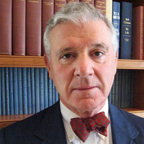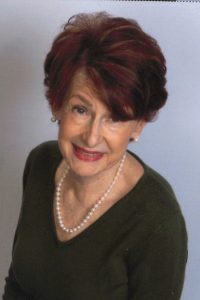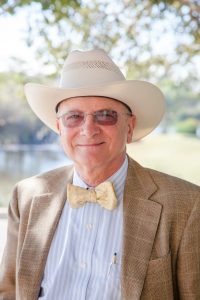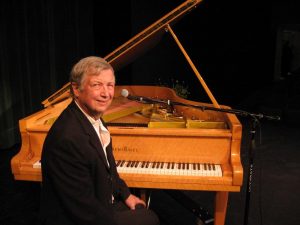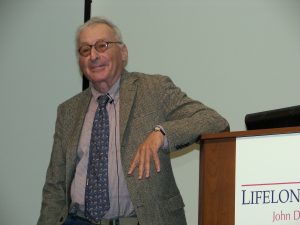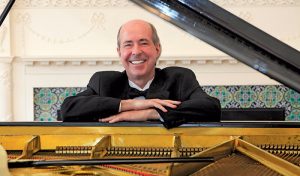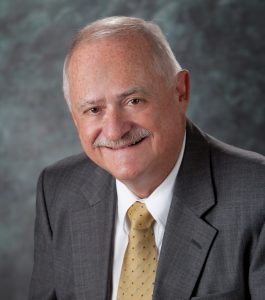Greetings OLLI students,
We have an exciting winter semester coming up! There’s music, science, literature…even sports! We also have a few new faces joining us such as musician Robert Wyatt and former TV/radio producer Bernadette Harrison. We hope you’re looking forward to the next semester as much as we are. Below is a preview of some of our winter lectures and courses.
Registration is now open. Click here to register.
Bernadette Harrison
The Mass Media Machine: Behind the Scenes with Newsers, Schmoozers, Boozers and Losers
# WPF1
Friday, January 10
10:00 – 11:30 a.m.
Welcome to the noisy news world of the 21st Century. The 24/7 constantly updated news cycle never sleeps and, as a result, you may not either.
As a news-talk producer for most of my 35-year career, I hope to help you filter through this highly opinionated, hyperbolic new media bombarding you throughout the day and night. Ideally, by the time you exit “The Mass Media Machine,” your eyes and ears will be finer-tuned for seeking the actual news in the news story. Especially as the 2020 presidential campaigns heat up.
Whether you are a fan of CNN, Fox, MSNBC, or prefer print over radio, or both, today’s ever-powerful news companies are motivated to seek your attention for one reason – financial gain. At the end of the day, it’s all about money. Let’s uncover a dozen or so take-aways in our get-together so to sharpen how you consume news. Consider these:
- What two highly addicting emotions are often scripted into the news – though not always intentional?
- What makes a story worth reporting?
- Anyone remember Walter Cronkite – and why do few current TV journalists follow his style?
- Where is the line between news and entertainment?
- Do you hear the biased language occasionally weaved into a newscast?
- What happens during the year-long news cycle (particularly the dip in August?)
- Is John and Jane Q. Public just marketing material used to sell soap ads?
- Why do some stories go missing from a lineup?
Unfortunately, I could go on. In fact, I will – on January 10th!
Irving Labovitz, J.D.
Current Contentious and Confusing Legal Battles
# W8R1
Thursdays – Jan 16, 23, 30; Feb 6, 13, 27; Mar 5, 12
2:30 – 4:00 p.m. (begins at 2:00 p.m. on Jan 16)
If you think the Winter semester will be boring…think again. It appears likely that the Supreme Court may be stressed with emergency appeals by both the Trump administration and the President individually, or by Democratic-based challengers, depending on the lower court “winners”, in imminent or pending early litigation involving: the Emoluments Clause; the President’s financial records and tax returns; Congressional subpoenas of Special Counsel Mueller’s Grand Jury testimony and exhibits; Congressional subpoenas demanding testimony of pivotal members of the Trump administration and related parties; Trump Organization records as to monies paid to alleged paramours of the President; and a multitude of additional equally “hot button” issues.
All legal and constitutional “roads appear to now lead” to a prospective impeachment effort by the House and any follow-on trial before the Senate.
‘You could not make this stuff up’!
As Mr. Spock would likely say…”I invite you to join my OSHER students to go where no class has gone before”.
Margery Marcus, Ed.D.
Royals Who Rocked the World: From the Tudors to the Windsors
# WPM1
Monday, January 1
11:30 – 1:00 p.m.
Please don’t tell Queen Elizabeth II that her claim to the British throne may be in question. Her distant ancestor Henry VII may have been the culprit who murdered the rightful heirs to take the throne for himself. Even if it has never been proven, it is fun to consider. And while we are considering the role of the Tudors in English history, don’t forget the great passion of Henry VIII for Anne Boleyn which changed the religion of the entire country.
While the Tudor line ended with Elizabeth I, the Stuart heirs had their own issues (a beheading for one thing). Next, the German House of Hanover gave England five Georges, one who lost the American colonies, and one who changed the family name to Windsor.
No rest for the newly minted Windsors though. They have dealt with an abdication, WW II, messy love affairs, divorces, deaths, Brexit and Boris.
Join me for a look at 500 years of British royalty from Henry VII through baby Archie Harrison Mountbatten-Windsor, the newest royal. I tell their family secrets!
Neil Katz, Ph.D.
Emotional Intelligence: Grow older; Grow wiser; Lead by example
# W1M2
Monday, January 27
12:00 – 1:30 p.m.
Do you want to give a lasting free gift to your children and grandchildren that will pay dividends every day of their life? Educate them about the importance and skills in emotional intelligence!!! Studies show that our baby boomer generation has much more emotional intelligence than the younger folks of today who spend most of their life on the computer and smart phones. This entertaining lecture, heavily populated with illuminating film clips and stories, will make you feel better about yourself and your age, and give you critical information to pass on to your loved ones.
Yoko Kothari
Piano Music by Beethoven and His Followers: Chopin and Liszt
# WNS1
Saturday, January 25
2:00 – 3:30 p.m.
Happy 250th Birth Year, Beethoven!
Beethoven is one of the most influential composers in history. Nearly all subsequent developments in classical music owe something to his work. He composed incredible amount of music in his 57 years of life; 9 symphonies, 5 piano concertos, 16 string quartets, 32 piano sonatas, to name a few. By the middle of his life he was almost totally deaf and had yet to produce his most profound works.
Celebrating his 250th birth anniversary year in 2020, this program features the piano music by Beethoven including his famous Moonlight Sonata, as well as music by Chopin and Liszt, who were inspired and influenced by Beethoven.
Stephen Kowel, Ph.D.
Electricity Wars: Edison, Tesla, Westinghouse, and Marconi
# W1R6
Thursday, January 30
12:00 – 1:30 p.m.
Who invented radio? The Russians credit Popov, the Italians and most Americans celebrate Marconi, the British hailed Lodge, but the US Supreme Court decided that Nicola Tesla actually invented radio. Sadly, Tesla died months before their decision.
Marconi gained the upper hand and became the dominant entrepreneur in radio by being the first to install his wireless stations on ships, resulting in miraculous rescues, most notably, the Titanic sinking, where more than 700 people were saved by ships alerted by Marconi wireless. (Ironically, Marconi and his family were scheduled to sail on the Titanic, cancelling at the very last minute.) A sensational British murder case of the day involved a Scotland Yard detective who raced across the Atlantic to intercept the perpetrator on another ship, with the entire chase managed by wireless.
Thomas Edison made sure that the first electric chair was powered by alternating current, hoping that the first grisly electrocution would convince the public that AC was too dangerous for general use. He even arranged public electrocutions of small animals to demonstrate the great threat posed by AC. In a last-ditch effort, Edison’s company, by then known as General Electric, actually filmed the dispatch of a grown elephant at Coney Island.
How ironic that today so many of our household implements, including LED lighting, computers, televisions, cell phones, alarms, and all battery-powered appliances, run on direct current. Today, electric automobiles running on batteries are gaining traction (pun intended). So we have to convert AC to DC in every room.
Robert Milne
The Saloon Piano Player Forum: Play or Perish
# WPS1
Saturday, January 11
1:00 – 2:30 p.m.
Ragtime: it was that “o-la-la” and “kick-up-your-heels” music that transformed America from stuffy concert halls to “Oh-you kid!” and was literally considered to be “shameless music with jungle instincts” by the high-society swells. Everyone loved it, and that’s exactly why the syncopated rhythms rolled over the naysayers like an uncaged tiger on the dance floor.
“But it’s the music of the devil!” screamed the ministers, which only added fuel to the “devil be damned!” attitudes that gave new life to moderate girl, now unleashed and uncensored to do what she liked. “Where is she?” wondered her parents, but everyone knew where she was. She was out dancing somewhere.
Who were these guys that played it? Keyboard maestros smoking cigars emerged in every corner saloon across the continent, wearing pin-striped shirts, stick-pin ties and boaters, and the dance was on. Nothing could stop them from playing it, not even the wrathful warnings coming from concert pianists in top conservatories who proclaimed that “ragtime is filth!” could impede its spread. For ragtime was here now, and it changed America’s musical landscape forever.
Bob Milne is one of the last holdovers from the saloon piano days, having played twenty-five years in barrooms and emporiums before becoming one of the most sought-after concert pianists of our day. His playing and stories of the era will fascinate you.
Benito Rakower, Ed.D.
The Isolating Dilemmas of Life in Film
# W8F3
Fridays – Jan 17, 24, 31; Feb 7, 14, 21, 28; Mar 6
1:30 – 4:30 p.m.
The films in this course deal with a problem first noticed in the Modern world that began in the 1920s – some say 1922. The long-established beliefs about the world, society and relationships were challenged in art, literature, and even physics. To be ever new and current, film had to depict this situation where the familiar world was becoming totally out of sorts.
The films in this course have a strangeness that comes from situations in which “there are no rules.” In Ride the Pink Horse – 1947 – Robert Montgomery goes to a New Mexico border town to find out what happened to his pal after the War. He finds a place whose surface ordinariness conceals a world so compromised and cynical that it he misses the meaning of the one seemingly innocent and kind relationship he has. A young Mexican girl tries to help him. He never understands why. When the audience does understand, it is as though we know nothing about human motivation. One of the truly great, American noir films that has been dormant for decades until recent re-discovery.
In differing ways, each of these films explores this theme. Don’t Look Now, with Julie Christie and Donald Sutherland, examines a good and successful marriage beset by an incomprehensible event.
Robert Wyatt
Judy Garland: Climbing Over the Rainbow
# WPF2
Friday, January 10
2:00 – 3:30 p.m.
Enjoy your fantasies and remembrances as American music specialist Robert Wyatt takes you through Garland’s extraordinary life. Film clips will be abundant, starting with The Broadway Melody of 1938 and moving through 1944 blockbuster Meet Me in St. Louis, The Harvey Girls, Cole Porter’s gem-ridden The Pirate of 1948 and the sizzling A Star is Born, the 1954 masterwork which became her last bravura film. TV specials like the 1962 The Judy Garland Show with Dean Martin and Frank Sinatra, the specials that featured Robert Goulet still basking from Camelot, and of course, the prized duos with daughter Liza Minnelli, will stimulate your evening.
Harvey Granat
Academy Award Winning Songs When You Could Still Sing Them
# W1RO
Thursday, February 6
7:00 – 8:30 p.m.
Did you ever wonder what ever happened to the great Academy Award winning songs we loved and sang over and over? I thought it would make for an interesting program to take the audience through the highlights of those good times and good songs through live performance and rare video clips of some of our greatest entertainers. We all like to sing along and there will be plenty of opportunity to do so. Of course, we’ll also look at when and why it changed and where is it likely to go!
Harvey Granat
The Golden Age of Broadway Part 3
# W4W4
Wednesdays – Feb 12, 19, 26; Mar 4
4:00 – 5:30 p.m.
I have enormous respect for the people who created The American Songbook and have had the opportunity to do programs on these 4 greats, interviewing people closely associated with them. This gives me the chance to present unique programs sharing stories audiences have rarely heard along with the great songs.
I discussed Harold Arlen with his biographer, Andy Propst and followed his career from singing in the synagogue where his father was the cantor to writing some of our most memorable songs.
I did 2 programs with Marvin Hamlisch’s widow and she told me stories about him that I will never forget; from his touring with Streisand, his entertaining 4 Presidents and his great deeds of humanity.
My Musical Director in New York is the son of Dorothy Fields. So, you can imagine the wonderful things I’ve learned about this extraordinary songwriter who was the first woman to win an Academy Award.
I produced Sammy Cahn on Broadway and through my friendship with him was able to observe the genius at work and appreciate the talent that led to 4 Academy Awards.
I want to share all these experiences with my audiences at FAU and take them “behind the scenes” of our great American musical heritage.
Mark C. Schug, Ph.D.
Economic Episodes in American History: An Economic Analysis of Key Events in America’s Past
# W4M3
Mondays – Feb 17, 24; Mar 2, 9
12:00 – 1:30 p.m.
A historian’s primary obligation is to help people today understand the past in the way that the people of the past saw it. We know how things turned out and that knowledge can drain the drama out of historical stories. The final outcome – the Americans and our Allies won World War II – seems inevitable.
But nothing is evitable. At all times, the people of the past were facing choices with limited information. It was their present. Imagine how separating from Great Britain must have appeared to people at the time. The British were the strongest military power of the age. They had boots on the ground, a mighty navy, and an immense war chest. The Americans had an inexperienced, underfunded, ragtag army. The outcome of the war was anything but certain. And yet, they defeated the mighty British. The world turned upside down. How could that happen?
The American Revolution lecture titled: Why Did the American Colonists Fight When They Were Safe, Prosperous, and Free? is set for February 17, 2020 at 12:00 noon. It will be followed by three others with connections to today:
- Were the Robber Barons Really Robbers or Barons? (Google and Amazon today?)
- Who Desegregated Major League Baseball: Jackie Robinson or Adam Smith? (Race and capitalism today)
- What Insights Does Economics Provide to Immigration in the United States? Implications for Today
I sure hope you will join us and gain some new insights into our rich heritage.
René Silvin
All That Glitters Is Not Gold: The Perils of Being Too Rich
# W1RC
Thursday, February 27
10:30 – 12:00 p.m.
It is easy to believe that the very wealthy, who may appear fascinating and enviable on the surface, also have peaceful, happy lives. However, the February 27 class will have a closer, more intimate look at 6 extremely wealthy women who had tragic lives and lonely deaths. To authentically illustrate these sensational yet tragic stories, I use dozens of glamorous pictures, newsreels and clips from movies and documentaries.
I will strive to make the presentation entertaining and informative while revealing personal anecdotes about Ann Woodward, Christina Onassis, Barbara Hutton and Gigi Jordan; all of whom I knew well. The story cannot be told without also including Leona Helmsley and Sunny von Bülow. Together these 6 ladies definitely prove all that glitters is not gold.
Gary Wiren, Ph.D.
Golf’s Most Interesting Characters Throughout the Game’s History
# W1RD
Thursday, March 5
6:00 – 7:30 p.m.
The stories about the game’s greatest players–Vardon, Hagen, Jones, Hogan, Palmer, Nicklaus, and “Tiger”, and others have often been told and are known even by the general public. But what about golf’s real “characters,” the ones who may have performed incredible feats or done strange things, overcome great odds, or were just plain weird yet quite interesting. Yes, the sometimes thought to be staid game of golf has attracted individuals who have taken the expected behavior of the game and turned it upside down, often in a very funny way. Others had more sad results. Expect to hear stories about some people you never knew existed. You will be surprised!
At the conclusion I will share my five most important tips in 60 years of teaching, followed by Q&A.



